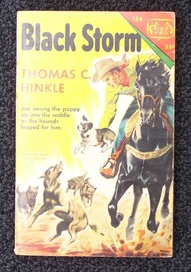 To be fair, four books is probably too many to recommend in one fell swoop. Even in a single, less pernicious swoop. Possibly in any nature of swoop, four is a lot of reading. I am scaling back. So here are three (3!) thematically-related recommendations. Even if you are NOT thinking about long open prairie vistas, inscrutable cattle, honest ponies, and other essential ranch bric-a-brac, I have some good books here. Stories about the American West never really fall out of fashion. The genre has been going strong for a century and more. And by genre, I mean those kinds of books Papa Joe was always happy to find in his Recorded Books packages from the library: straightforward tales where the reader knows what to expect. There will be good guys, bad guys, horses, handguns, a conflict somebody is likely to win. The lone hero loping through the saguaro cactus and purple sage in search of revenge? Yup. Masters of the genre include Zane Grey and Louis L'Amour, and more recently, Elmer Kelton. Though the following three books share some Western elements -- roving the open range, for instance -- these books do not fall in inside the boundaries of genre. They are not predictable, not straightforward, and not forgettable.
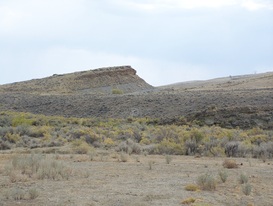 Writing about Wyoming, Annie Proulx (The Shipping News and Brokeback Mountain) ropes and wrangles the accent, the reticence, and the iron grit of the wildest state (sorry Texas!) in the lower 48. Proulx (pronounced "prue" btw) is one of those writers who holds very little truck with publicity (check out this Paris Review interview) preferring instead to do her work: which is to learn about stuff and then write about it and let readers do what they will. She's written three wide-ranging collections of Wyoming stories in recent years. Each of her story collections is great. Get this book, Bad Dirt, and put it in your car. Trust me, next time you are stuck in a waiting room, turn to one of Proulx stories -- these quick, searing sketches make a perfect short, smartening read instead of a round of whatever electronic distraction is sapping the strength these days. Carmac McCarthy is widely praised as one of the greatest living American novelists -- a fact that, shamefully, rouses my prejudice against the traditional white lions of American letters: John Updike, Joseph Heller, and Philip Roth are among the writers I should probably admire more, but don't. Despite the hype, Carmac McCarthy's work, including recent award-winners No Country for Old Men and the post-Apocalyptic The Road, earn the praise honestly. I like this earlier novel. It seems marginally less bleak -- as I read it -- than his later work. All the Pretty Horses (the name comes from the traditional lullaby) follows young John Grady Cole across the border to Mexico. It takes place around 1950, past the classic heyday of the cowboy, but the boy sets out for his adventure, his horse, and his heartbreak. Standard-enough sounding plot, but the writing--! McCarthy is not afraid to throw it out there in ways that break all kinds of writing rules: "They heard somewhere in that tenantless night a bell that tolled and ceased where no bell was and they rode out on the round dais of the earth which alone was dark and no light to it and which carried their figures and bore them up into the swarming stars so that they rode not under but among them and they rode at once jaunty and circumspect, like thieves newly loosed in that dark electric, like young thieves in a glowing orchard, loosely jacketed against the cold and ten thousand worlds for the choosing." Don't try writing that at home, kids. But do read it. 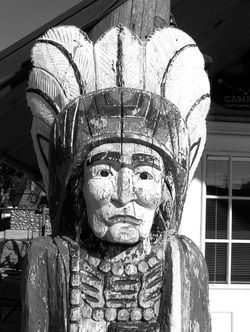 And with a view from across the aisle, Sherman Alexie... a poet and writer who grew up on the Spokane Indian reservation in Washington. His first book, Lone Ranger and Tonto Fistfight in Heaven, is a collection of related short-stories about Thomas Builds-the-Fire and Victor Joseph growing up on the rez. The boys play basketball, tell stories, try to make sense of the wreckage of their families. The heartbreaking part sneaks up on you -- the characters are deadpan funny about the realities of living under the not-so-benign rule of the BIA (Bureau of Indian Affairs) in a community racked by poverty and alcoholism: "It's hard to be optimistic on the reservation. When a glass sits on a table here, people don't wonder if it's half filled or half empty. They just hope it's good beer. Still, Indians have a way of surviving. But it's almost like Indians can easily survive the big stuff. Mass murder, loss of language and land rights. It's the small things that hurt the most. The white waitress who wouldn't take an order, Tonto, the Washington Redskins." Not a reader? (Okay, what the hecky-doodle are you reading this blog entry for? Extra points? Seriously?) Try the movie. Alexie, who is engaging, funny, telegenic, and clearly quite comfortable in the 21st Century (far more than Proulx or McCarthy-- his website and plenty of Youtube video as evidence) made one of the stories in Lone Ranger and Tonto into a lovely independent film called Smoke Signals. If it's not in your Netflix queue already, branch out a little already.
0 Comments
Leave a Reply. |
About the Blog
A lot of ground gets covered on this blog -- from sailboat racing to book suggestions to plain old piffle. FollowTrying to keep track? Follow me on Facebook or Twitter or if you use an aggregator, click the RSS option below.
Old school? Sign up for the newsletter and I'll shoot you a short e-mail when there's something new.
Archives
June 2024
Categories
All
|
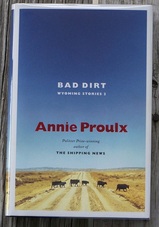
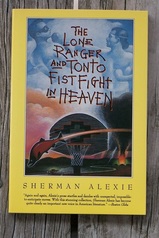
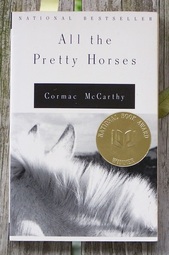
 RSS Feed
RSS Feed
